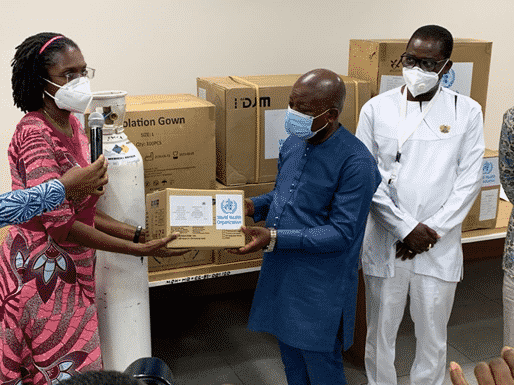How WHO transforms funding into action in regions around the world

As the COVID-19 pandemic continues, WHO remains active on many fronts–from delivering equipment and issuing guidelines, to fighting misinformation and protecting vulnerable populations, and more. Here are some ongoing activities WHO was able to carry out in recent weeks thanks to the vital backing of its many donors:
Leading the push for equitable access to COVID-19 vaccines for Africa

Story published on 4 February 2021 by WHO/AFRO.
COVAX has notified countries in Africa of the estimated dose allocation for the first phase of COVID-19 vaccine delivery. The global initiative led by WHO, Gavi (the Vaccine Alliance) and the Coalition for Epidemic Preparedness Innovations (CEPI) aims to start shipping nearly 90 million COVID-19 vaccine doses to the continent in February, in what is envisaged to be Africa’s largest-ever mass vaccination campaign.
This initial phase will support countries to immunize 3% of the African population most in need of protection, including health workers and other vulnerable groups, in the first half of 2021. As production capacity increases and more vaccines become available, the aim is to vaccinate at least 20% of Africa by providing up to 600 million doses by the end of 2021. WHO has been advocating for equitable vaccine access throughout the pandemic.
Spreading accurate COVID-19 information in a hard-to-reach region in Uganda

Story published on 3 February 2021 by WHO/AFRO.
A WHO support team recently conducted a field visit to the shores of Lake Edward at Rwenshama Landing site, a flood battered hard-to-reach region in Uganda that previously faced an intense cholera outbreak. The WHO team was able to provide vital COVID-19 information about protection and control, equipping community leaders with knowledge and information about the underlying health risks related to the virus. The WHO team reported that the feedback from the citizens was invaluable throughout the process. During the visit, WHO also donated a stock of infection prevention and control material.
WHO works with Ghana to fight COVID-19

Story published on 3 February 2021 by WHO/AFRO. Dr Sally Ann Ohene (World Bank disease prevention & control Officer) presenting the equipment to Minister of Health, Mr Kwaku Agyeman-Manu.
With Ghana currently facing an increase in cases of COVID-19, WHO continues to provide support to the country to reduce infection rates and mitigate the spread of virus.
WHO recently delivered a large stock of supplies to be distributed to the country’s treatment centres, the National Ambulance Service and some selected laboratories in regions with a high burden of COVID-19 cases. In addition, the National Ambulance Service received funding from WHO to procure fuel to transport COVID-19 patients to designated facilities in the region. Together with the UN Family, WHO also donated 120 oxygen cylinders (with oxygen) to the Ghana Infectious Disease Centre to help manage the increase in severe and critical cases of COVID-19
The latest donation also included 4 970 Gene Expert Cartridges, 15 000 KN 95 respirator masks, 32 patient monitors, shields, examination gloves, goggles, gowns, and medical masks thanks to support from the World Bank Pandemic Emergency Financing Facility.
Dismantling gender stereotypes to harness science’s full potential in Bangladesh

Story published on 10 February 2021 by WHO/SEARO.
As a woman, scientist, and mother, Dr Adneen Moureen is leading a hardworking team of 26 staff at the IEDCR Field Laboratory in Cox’s Bazar, supporting the response to COVID-19 in the world’s largest refugee camp.
Established three years ago, in response to the Rohingya humanitarian crisis, the IEDCR Field Laboratory in Cox’s Bazar has supported the early detection of vaccine-preventable disease outbreaks and other communicable diseases. However, it was in early 2020, when the coronavirus pandemic was declared, that the laboratory became largely recognized as the only one testing COVID-19 samples coming from the entire Cox’s Bazar district, Bandarban district, the Rohingya community and parts of Chittagong division.
Following a request from IEDCR-Dhaka, WHO is currently supporting the expansion of the laboratory which will increase storage capacity as well as expand the processing and analysis of samples.
Read more about Dr Adneen Moureen and her work on the occasion of the recent International Day of Women and Girls in Science.















